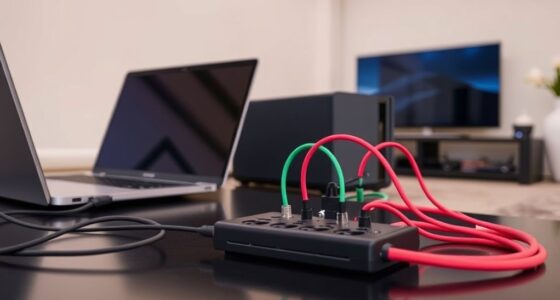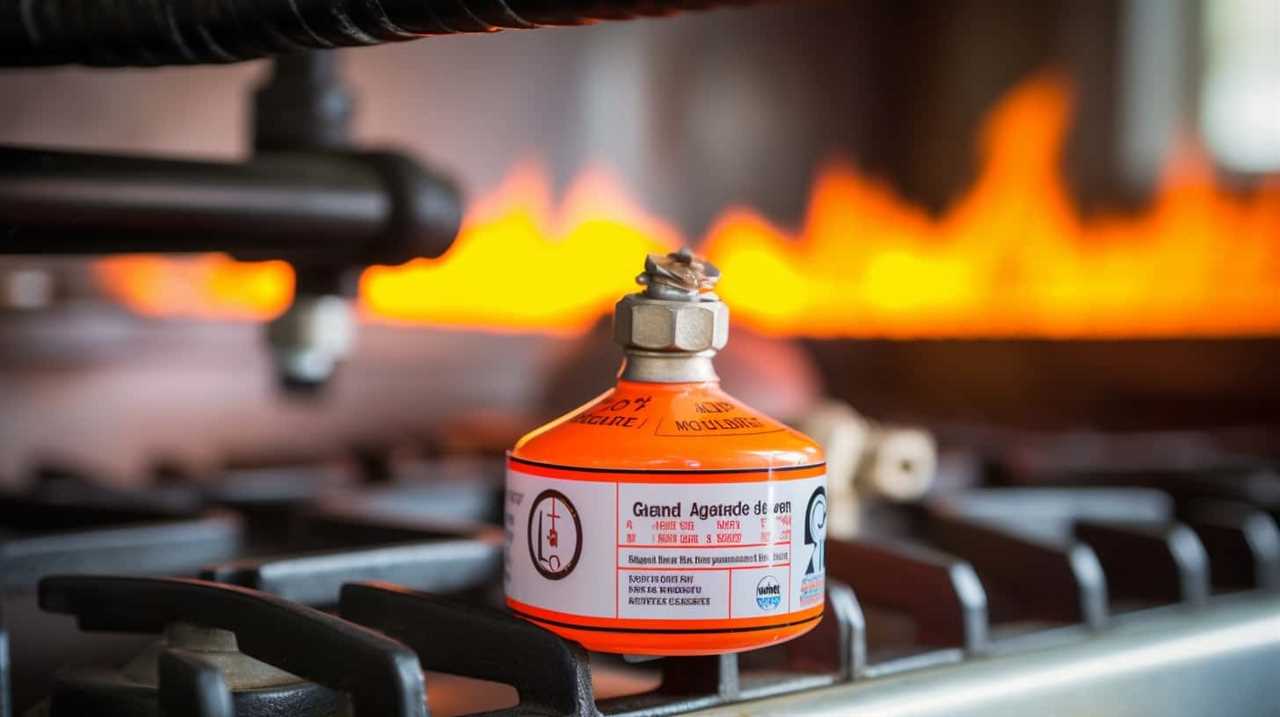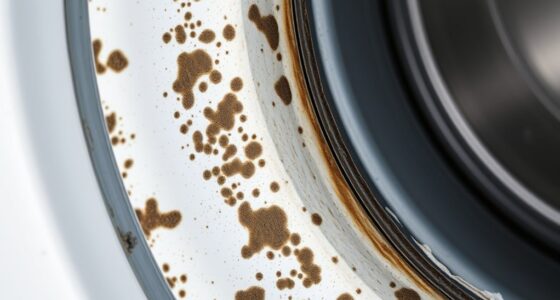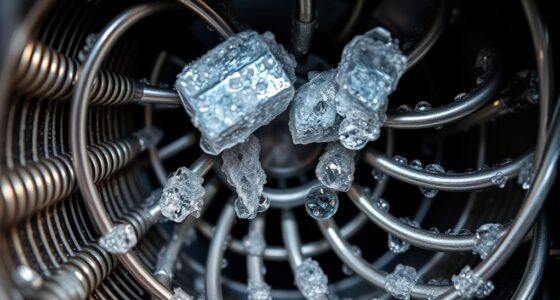Do you feel frustrated with constant breakdowns and costly repairs on your commercial appliances?
Well, we’ve got some good news for you! In this guide, we will explore the top tips for commercial appliance maintenance that will help you keep your equipment in top-notch condition.
Whether you own a restaurant, hotel, or any other establishment that heavily relies on commercial appliances, regular maintenance is crucial for ensuring their longevity and optimal performance.
By following our expert advice and implementing these maintenance practices, you can avoid unexpected breakdowns, reduce repair costs, and ultimately, improve the efficiency of your appliances.

So, let’s dive in and discover the truth behind effective commercial appliance maintenance!
Key Takeaways
- Regular maintenance is important for early detection and resolution of potential issues, prevention of major breakdowns and costly repairs, improved energy efficiency, extended lifespan of appliances, and enhanced safety for employees and customers.
- Cleaning and sanitizing appliances should be done using effective cleaning products, following manufacturer’s instructions, establishing regular routines, focusing on high-touch areas and hard-to-reach places, and ensuring a hygienic and safe environment for employees and customers.
- Checking and replacing filters regularly ensures optimal efficiency and performance of appliances, prevents reduced airflow and decreased energy efficiency, avoids potential damage to appliances, and improves air quality and maintains a healthy indoor environment.
- Implementing a comprehensive maintenance plan prioritizes regular maintenance as part of a plan that includes cleaning, sanitizing, and filter checks/replacements. This maximizes performance and longevity of commercial appliances, improves energy efficiency, reduces downtime, enhances productivity, and minimizes costs associated with repairs or replacements.
Importance of Regular Maintenance
Regular maintenance of commercial appliances is crucial for ensuring their optimal performance and longevity. By implementing a regular maintenance schedule, businesses can reap several benefits.
First and foremost, regular maintenance allows for the early detection and resolution of any potential issues or malfunctions. This proactive approach helps to prevent major breakdowns and costly repairs down the line.
In addition, regular maintenance ensures that appliances are operating at their peak efficiency, resulting in significant cost savings. Well-maintained appliances consume less energy, which translates to lower utility bills and reduced environmental impact.
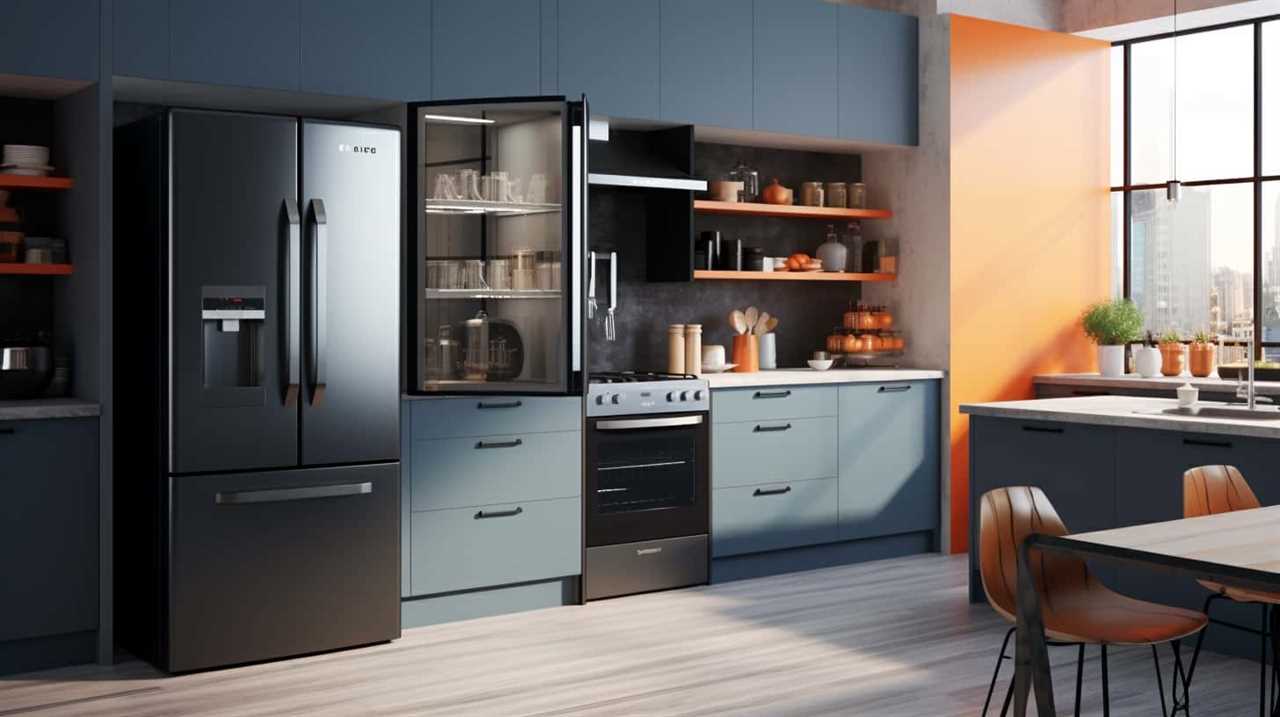
Moreover, regular maintenance extends the lifespan of commercial appliances. By addressing minor issues promptly, businesses can avoid premature wear and tear, which could otherwise lead to the need for premature replacements. This not only saves money but also reduces the disruption caused by equipment downtime.
Furthermore, regular maintenance enhances the overall safety of commercial appliances. Faulty or malfunctioning equipment can pose serious risks to employees and customers, increasing the likelihood of accidents and injuries. By conducting regular inspections and servicing, potential hazards can be identified and mitigated, ensuring a safe working environment.
Cleaning and Sanitizing Appliances
When it comes to commercial appliance maintenance, one of the key aspects is cleaning and sanitizing the appliances. Effective cleaning techniques are crucial to ensure the longevity and optimal performance of the appliances.
Regular maintenance of appliances not only helps in preventing breakdowns but also ensures a hygienic and safe environment for both employees and customers.

Effective Cleaning Techniques
To ensure optimal cleanliness and hygiene, we rely on a comprehensive approach to cleaning and sanitizing appliances using a combination of effective techniques.
When it comes to effective cleaning techniques, it’s important to use the best cleaning products available. These products should be specifically designed for commercial appliances and capable of removing tough stains, grease, and bacteria. Look for cleaning products that have high antimicrobial properties and are approved by regulatory agencies.
Additionally, it’s crucial to follow the manufacturer’s instructions for proper dilution and application. Regular cleaning and sanitizing routines should be established and adhered to, focusing on high-touch areas and hard-to-reach places.
Importance of Regular Maintenance
For our commercial appliances, it’s essential that we prioritize regular maintenance, including cleaning and sanitizing, to ensure their optimal performance and longevity.
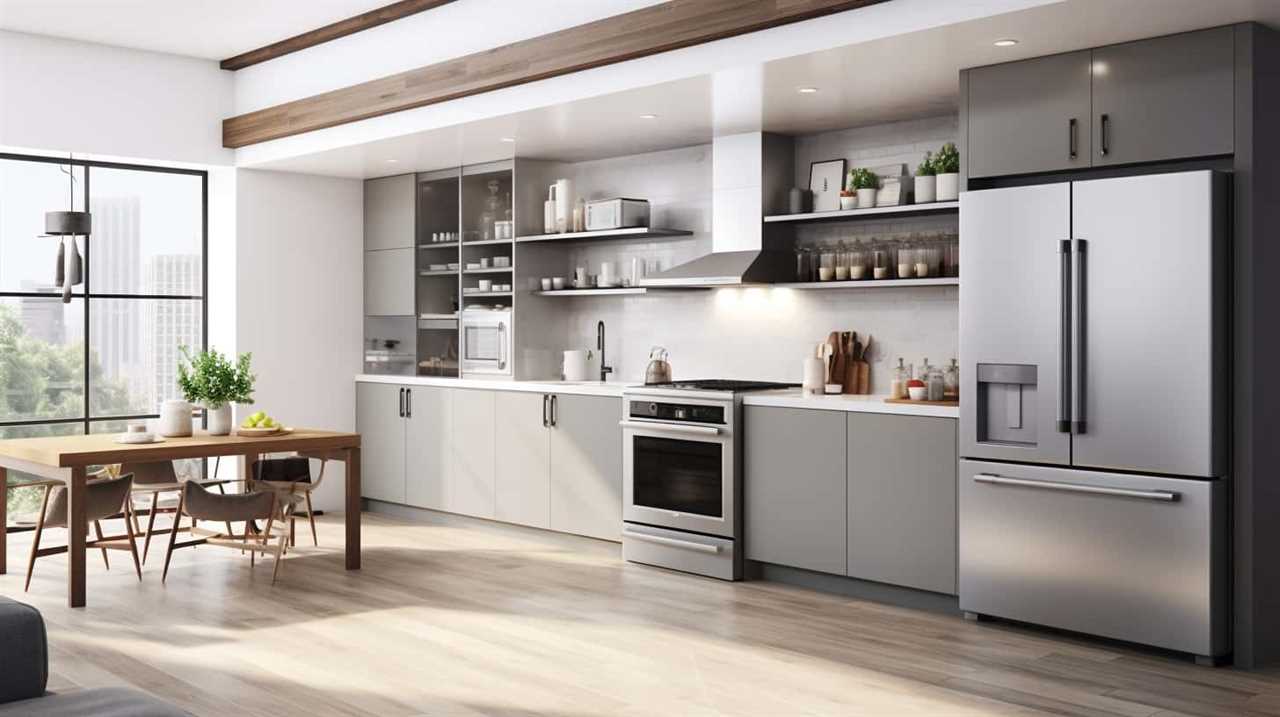
The importance of preventive maintenance can’t be overstated, as it helps us identify and address potential issues before they escalate into major problems. By maintaining a regular cleaning and sanitizing routine, we can prevent the buildup of dirt, grease, and bacteria that can compromise the efficiency and safety of our appliances.
Regular maintenance also allows us to extend the lifespan of our appliances, saving us from costly repairs or replacements. Additionally, the benefits of regular maintenance include improved energy efficiency, reduced downtime, and enhanced productivity.
It’s crucial to implement a comprehensive maintenance plan that includes regular cleaning and sanitizing to maximize the performance and longevity of our commercial appliances.
Checking and Replacing Filters
Regular maintenance is crucial for the proper functioning of commercial appliances. Checking and replacing filters is an essential part of this process. By regularly inspecting and replacing filters, we can ensure that the appliances are operating at their optimal efficiency. This not only improves their performance but also extends their lifespan.

Neglecting filter maintenance can result in reduced airflow, decreased energy efficiency, and even potential damage to the appliances. Therefore, it is important to prioritize filter maintenance as part of a regular maintenance routine.
Importance of Regular Maintenance
When it comes to commercial appliance maintenance, we can’t stress enough the significance of regularly checking and replacing filters. Regular maintenance benefits include improved performance, energy efficiency, and enhanced air quality.
Filters play a crucial role in trapping airborne particles, such as dust, dirt, and allergens. Over time, these particles accumulate and can clog the filters, reducing their effectiveness and putting a strain on the appliance.
By adhering to a maintenance schedule that includes routine filter checks and replacements, you can ensure that your appliances operate at optimal levels and maintain a healthy indoor environment. Neglecting filter maintenance can lead to decreased efficiency, increased energy consumption, and potential breakdowns.

With regular filter maintenance, you can extend the lifespan of your appliances and avoid costly repairs or replacements.
Extending Appliance Lifespan
To extend the lifespan of our appliances, we regularly check and replace filters. Filters play a crucial role in maintaining the efficiency and performance of commercial appliances. Over time, filters can become clogged with dirt, dust, and grease, which can restrict airflow and strain the appliance’s components. By checking and replacing filters on a regular basis, we can prevent breakdowns and ensure that our appliances continue to operate at their optimal level.
To help you keep track of filter maintenance, here is a simple table outlining the recommended frequency for checking and replacing filters in different commercial appliances:
| Appliance | Check Frequency | Replace Frequency |
|---|---|---|
| Refrigerators | Monthly | Every 3-6 months |
| Ovens | Monthly | Every 6-12 months |
| Dishwashers | Monthly | Every 3-6 months |
| Air Conditioners | Monthly | Every 3-6 months |
| Deep Fryers | Weekly | Every 1-2 months |
Inspecting and Repairing Electrical Components
Before we move on to inspecting and repairing electrical components, it’s important to understand the significance of regular maintenance in commercial appliances. Taking the time to inspect and repair electrical components can help prevent costly breakdowns and ensure the safety and efficiency of your appliances. Here are some key tips for inspecting and repairing electrical components:
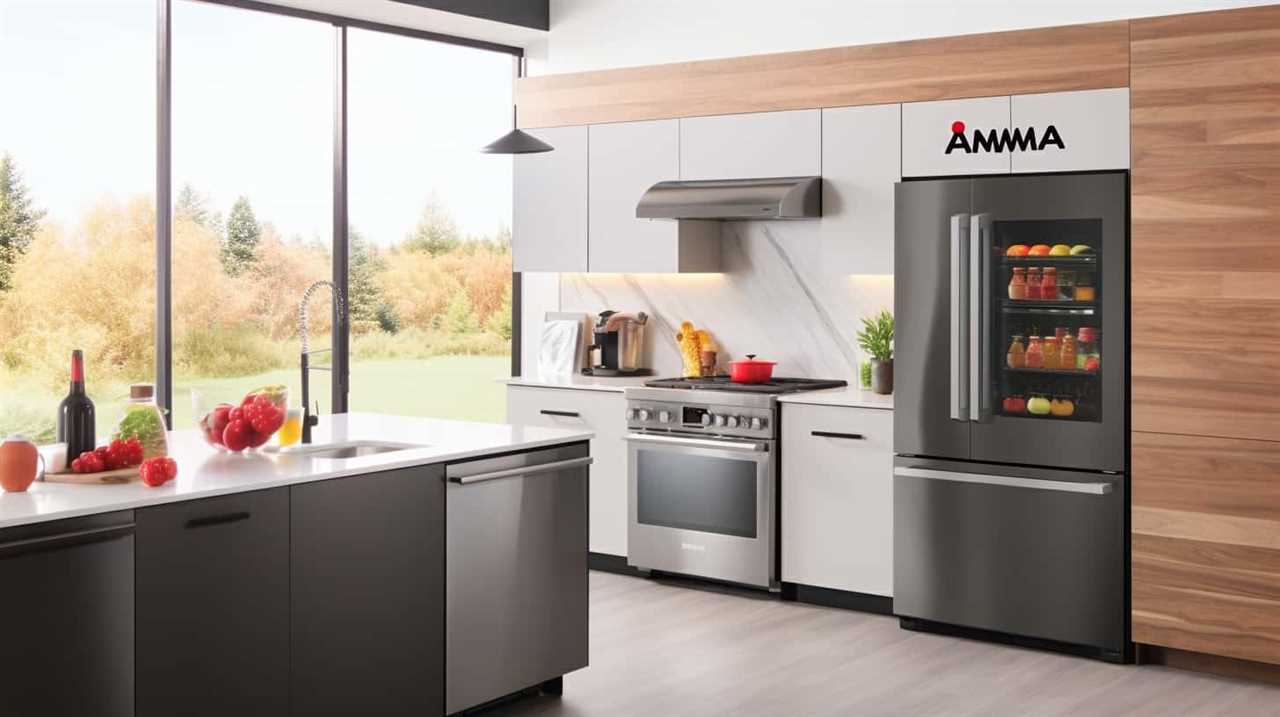
- Inspecting Electrical Wiring:
- Check for any frayed or damaged wiring.
- Look for loose connections or signs of overheating, such as burnt marks or melted insulation.
- Test the functionality of switches, outlets, and controls.
- Replacing Damaged Components:
- If you find any damaged or faulty electrical components, such as switches or fuses, replace them immediately.
- Use high-quality replacement parts that are compatible with your appliance.
- Follow the manufacturer’s instructions and safety guidelines for proper installation.
Regularly inspecting electrical wiring and promptly replacing damaged components is crucial to maintaining the electrical safety of your commercial appliances. By ensuring that all electrical connections are secure and functioning properly, you can minimize the risk of electrical hazards and maximize the lifespan of your appliances.
Now that we’ve covered the inspection and repair of electrical components, let’s move on to the next important step: lubricating moving parts.
Lubricating Moving Parts
To properly maintain commercial appliances, we need to address the essential task of lubricating the moving parts. Proper lubrication ensures smooth operation, reduces friction, and extends the lifespan of the appliance. When it comes to lubricant selection, it is crucial to use the right type of lubricant for each specific application. Different parts may require different lubricants, such as silicone-based lubricants for rubber components and oil-based lubricants for metal parts.
To help you visualize the importance of lubricating moving parts, here is a table showcasing common moving parts in commercial appliances and their corresponding lubricants:

| Moving Part | Lubricant Selection |
|---|---|
| Bearings | Grease |
| Hinges and Latches | Oil or Graphite |
| Conveyor Belts | Silicone Lubricant |
Proper application of the lubricant is equally important. Before applying the lubricant, ensure that the parts are clean and free from debris. Apply the lubricant sparingly, using the manufacturer’s recommendations as a guide. Over-lubricating can lead to excess buildup and attract dirt, while under-lubricating may result in increased friction and premature wear.
With the moving parts properly lubricated, we can now move on to the next crucial step in commercial appliance maintenance: properly calibrating temperature controls. This ensures optimal performance and energy efficiency.
Properly Calibrating Temperature Controls
Now that we’ve properly lubricated the moving parts, let’s move on to calibrating the temperature controls for optimal performance and energy efficiency.
Proper calibration of temperature controls is crucial in maintaining the desired temperature and ensuring the appliance operates at its best. Here are some tips for calibrating temperature controls:

- Calibrating Temperature Sensors:
- Begin by locating the temperature sensors in your appliance. These sensors are responsible for measuring the temperature inside the unit.
- Use a calibrated thermometer to compare the readings from the temperature sensors with the actual temperature. If there’s a significant difference, the sensors may need calibration.
- Follow the manufacturer’s instructions to adjust the temperature sensors accordingly and ensure accurate temperature measurements.
- Troubleshooting Temperature Control Issues:
- If the temperature controls aren’t responding or the temperature is fluctuating excessively, check for any loose connections or damaged wiring. Repair or replace as necessary.
- Inspect the control panel for any signs of damage or malfunction. Clean any dirt or debris that may be affecting the controls’ performance.
- If the issues persist, consult the appliance’s manual or contact a professional technician for further assistance.
Cleaning and Maintaining Condenser Coils
Let’s start by cleaning and maintaining the condenser coils for optimal performance and efficiency. The condenser coils in commercial appliances play a crucial role in the refrigeration process, and keeping them clean is essential to ensure the smooth operation of your equipment. Over time, dust, dirt, and debris can accumulate on the coils, hindering their ability to release heat effectively. This buildup can lead to reduced cooling efficiency and increased energy consumption.
To clean the condenser coils, begin by disconnecting the power supply to the appliance. Next, remove any protective grilles or covers to access the coils. It’s advisable to use a soft brush or a vacuum cleaner with a brush attachment to gently remove the accumulated debris. Ensure that the brush bristles or vacuum don’t damage the delicate fins of the coils. For stubborn dirt or grease, a mild detergent or coil cleaner can be used. However, be cautious not to use harsh chemicals that can corrode the coils.
Sanitizing methods can also be applied to the condenser coils to prevent the growth of bacteria or mold. One effective technique is using a food-grade sanitizing solution that’s safe for use in foodservice environments. Apply the solution to the coils and allow it to sit for the recommended time before rinsing thoroughly with clean water.
Regular cleaning and maintenance of the condenser coils using these cleaning techniques and sanitizing methods won’t only ensure optimal performance and efficiency but also extend the lifespan of your commercial appliances.

Testing and Adjusting Water Pressure
After ensuring the condenser coils are clean and properly maintained, we can move on to testing and adjusting the water pressure for optimal performance of your commercial appliances. Water pressure plays a crucial role in the functioning of various appliances, such as dishwashers, steamers, and ice machines.
Here are some key steps to follow when testing and adjusting water pressure:
- Step 1: Measure the water pressure: Use a pressure gauge to measure the water pressure at the appliance’s water inlet. This will give you an accurate reading of the current pressure level.
- Step 2: Compare with manufacturer’s specifications: Refer to the appliance’s manual or contact the manufacturer to determine the recommended water pressure range. Compare the measured pressure with the specified range to identify whether any adjustments are necessary.
- Step 3: Adjust the water pressure: If the measured pressure is outside the recommended range, adjustments may be required. This can be done using a pressure regulator or a flow restrictor, depending on the specific appliance and its requirements.
- Step 4: Recheck the water pressure: After making the necessary adjustments, re-measure the water pressure to ensure it falls within the recommended range. This will help ensure the optimal performance and longevity of your commercial appliances.
Regularly Checking for Leaks
To ensure the proper functioning of your commercial appliances, it is essential for us to regularly check for leaks throughout your facility. Leaks can cause significant damage to your appliances and lead to costly repairs or replacements. By conducting routine leak detection and prevention measures, you can avoid these issues and maintain the efficiency and longevity of your equipment.
One effective way to check for leaks is by inspecting all visible pipes and connections for any signs of leakage, such as water stains, puddles, or corrosion. Additionally, using leak detection tools, such as infrared cameras or ultrasonic detectors, can help identify hidden leaks that are not easily visible to the naked eye.

Regularly checking for leaks should be a part of your preventive maintenance routine. By incorporating this practice into your maintenance schedule, you can catch leaks early and prevent them from escalating into more significant problems. The table below summarizes the key steps for leak detection and prevention:
| Step | Description |
|---|---|
| Inspect visible pipes and connections | Check for signs of leakage, such as water stains, puddles, or corrosion |
| Use leak detection tools | Utilize infrared cameras or ultrasonic detectors to identify hidden leaks |
| Incorporate regular leak checks | Include leak checks in your preventive maintenance routine |
| Take immediate action | Address any identified leaks promptly to prevent further damage |
Cleaning and Maintaining Gas Burners
How can we effectively clean and maintain gas burners to ensure their optimal performance? Gas burner troubleshooting and addressing common gas burner issues are crucial for maintaining the efficiency and longevity of these appliances. Here are some key steps to consider:
- Cleaning the Burner: Regularly clean the burner to remove any dirt, debris, or grease buildup. Use a soft brush or a cloth to gently wipe away the residue. Ensure that the burner is completely cool before cleaning it.
- Inspecting for Damage: Regularly inspect the burner for any signs of damage, such as cracks or corrosion. If any damage is found, it’s important to address it promptly to prevent further issues.
- Checking for Proper Ignition: Verify that the burner ignites properly, without any delay or abnormal sounds. If the burner fails to ignite or exhibits irregularities, it may indicate a problem with the ignition system that needs to be addressed.
- Adjusting the Flame: The flame should be blue and stable, without any yellow or orange tints. If the flame is yellow or flickering, it may indicate an issue with the air-to-fuel ratio. Adjust the air shutter or consult a professional to ensure proper combustion.
- Maintaining Ventilation: Adequate ventilation is crucial for the safe operation of gas burners. Ensure that the area around the burner is free from obstructions and that the ventilation system is functioning properly.
Inspecting and Cleaning Exhaust Hoods
To ensure the optimal performance of your commercial appliances, it is essential to regularly inspect and clean exhaust hoods. Proper maintenance of exhaust hoods is crucial for maintaining a clean and safe kitchen environment. Neglecting this task can result in reduced efficiency, increased energy consumption, and potential fire hazards. In this section, we will discuss the importance of inspecting ventilation systems and removing grease buildup from exhaust hoods.
When inspecting the ventilation system, it is important to check for any signs of damage or blockage. Inspect the exhaust hood and ductwork for cracks, loose fittings, or excessive grease buildup. Ensure that the fan is operating properly and that the airflow is adequate. Any issues should be addressed promptly to prevent further damage and to maintain proper airflow.

Cleaning the exhaust hood is imperative to remove grease buildup, which can accumulate over time and pose a fire risk. The frequency of cleaning will depend on the volume and type of cooking done in your kitchen. It is recommended to clean the exhaust hood and ductwork at least once every three months. Use a degreaser and a brush to remove grease from all surfaces, including the fan blades, filters, and ductwork. Regular cleaning will not only improve the performance of your exhaust hood but also extend its lifespan.
For a more detailed guide on inspecting and cleaning exhaust hoods, refer to the table below:
| Inspection Steps | Cleaning Steps |
|---|---|
| Check for damage or blockage in the ventilation system | Use a degreaser and brush to remove grease buildup |
| Inspect the exhaust hood and ductwork for cracks or loose fittings | Clean fan blades, filters, and ductwork |
| Ensure the fan is operating properly and the airflow is adequate | Clean all surfaces thoroughly |
| Address any issues promptly to prevent further damage | Clean the exhaust hood and ductwork at least once every three months |
Properly Storing and Organizing Appliance Parts
When it comes to properly storing and organizing appliance parts, there are a few key points to keep in mind.
First, efficient part storage is essential for maintaining a streamlined workflow and minimizing downtime. This can be achieved by utilizing shelving systems, bins, or drawers to keep parts organized and easily accessible.

Labeling is also crucial, as it ensures that parts can be quickly identified and located when needed.
Lastly, taking steps to prevent damage and loss, such as using protective packaging or implementing a tracking system, can help preserve the longevity of appliance parts.
Efficient Part Storage
Proper organization is essential for efficient part storage in commercial appliance maintenance. Effective part organization and inventory management can save time and reduce costs by ensuring that the right parts are readily available when needed. Here are some key tips:
- Categorize parts: Group similar parts together based on their type, size, or function. This makes it easier to locate specific parts quickly and reduces the chances of misplacing or losing them.
- Use clear labeling: Clearly label each part with its name, part number, and any other relevant information. This helps in easy identification and prevents confusion.
- Utilize barcode systems: Implementing a barcode system can streamline inventory management and improve accuracy in tracking parts. Barcode scanners can quickly identify and locate specific parts, minimizing human error.
- Invest in storage solutions: Utilize shelves, bins, or cabinets with adjustable dividers to maximize space and ensure efficient use of storage areas. This allows for better organization and easy access to parts.
Labeling for Easy Access
Our approach to labeling ensures easy access to appliance parts. Proper organization and labeling techniques play a crucial role in maintaining an efficient commercial appliance maintenance system.
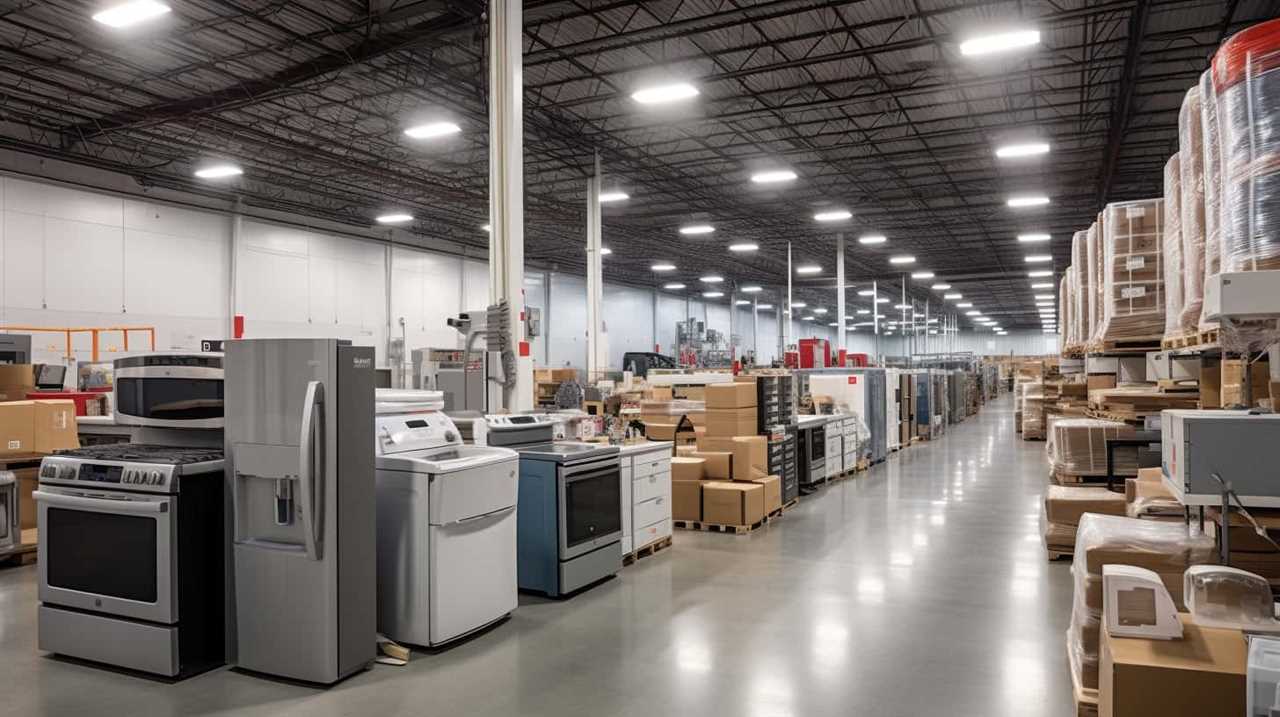
By implementing effective labeling methods, such as using clear and concise labels, color coding, and alphanumeric codes, you can streamline the process of locating and retrieving appliance parts. Labeling should be done in a consistent and standardized manner, ensuring that all parts are clearly identified and categorized.
Additionally, organizing methods such as using bins, shelves, and storage cabinets can further enhance accessibility and prevent parts from getting misplaced.
Preventing Damage and Loss
To prevent damage and loss, we prioritize proper storage and organization of appliance parts. This not only helps in preventing accidents but also reduces downtime by ensuring that the necessary parts are easily accessible when needed.
Here are some key tips for storing and organizing appliance parts:

- Categorize parts: Group similar parts together and label them accordingly. This makes it easier to find specific parts when required.
- Use clear containers: Store parts in clear, airtight containers to protect them from dust, moisture, and other potential damages.
- Implement a labeling system: Clearly label each container with the name of the part, its model number, and any other relevant information. This ensures easy identification and prevents mix-ups.
- Create a designated storage area: Dedicate a specific area in your facility for storing appliance parts. This helps in keeping everything organized and easily accessible.
Properly storing and organizing appliance parts is crucial for preventing damage and loss, ultimately reducing downtime. However, it’s equally important to train staff on appliance maintenance procedures to ensure effective and efficient use of these parts.
Training Staff on Appliance Maintenance Procedures
When training staff on appliance maintenance procedures, it’s important to emphasize the importance of regular inspections and cleaning. By implementing effective training methods, we can ensure staff engagement and promote a culture of maintenance excellence.
To begin, it’s crucial to provide comprehensive training sessions that cover all aspects of appliance maintenance. These sessions should include detailed instructions on inspection procedures, such as checking for loose connections, worn-out parts, and signs of damage. Staff should be trained to recognize potential issues early on to prevent costly repairs or breakdowns.
Additionally, training should focus on proper cleaning techniques. Staff should be educated on the correct use of cleaning agents, tools, and equipment to effectively remove dirt, grease, and other contaminants. Emphasize the importance of following manufacturer’s guidelines to avoid damaging sensitive components.

To enhance staff engagement, consider interactive training methods such as hands-on demonstrations and simulations. This allows employees to practice their skills and gain confidence in performing maintenance tasks. Encourage open communication and provide opportunities for staff to ask questions and seek clarification.
Regular refresher courses and ongoing training sessions are also essential to ensure that staff stay updated on the latest maintenance procedures and technologies. By investing in staff training, businesses can improve appliance performance, extend their lifespan, and minimize downtime. Ultimately, a well-trained workforce will contribute to the overall success and efficiency of the organization.
Frequently Asked Questions
How Often Should Commercial Appliances Be Professionally Serviced?
We believe that commercial appliances should be professionally serviced regularly for optimal performance and longevity. The frequency of commercial appliance maintenance depends on various factors such as the type of appliance, usage, and manufacturer recommendations.
Professional servicing is crucial as it ensures that any potential issues are addressed promptly and efficiently, preventing costly breakdowns and ensuring the safety of your staff and customers. Regular professional maintenance also helps to maintain energy efficiency and prolong the lifespan of your commercial appliances.
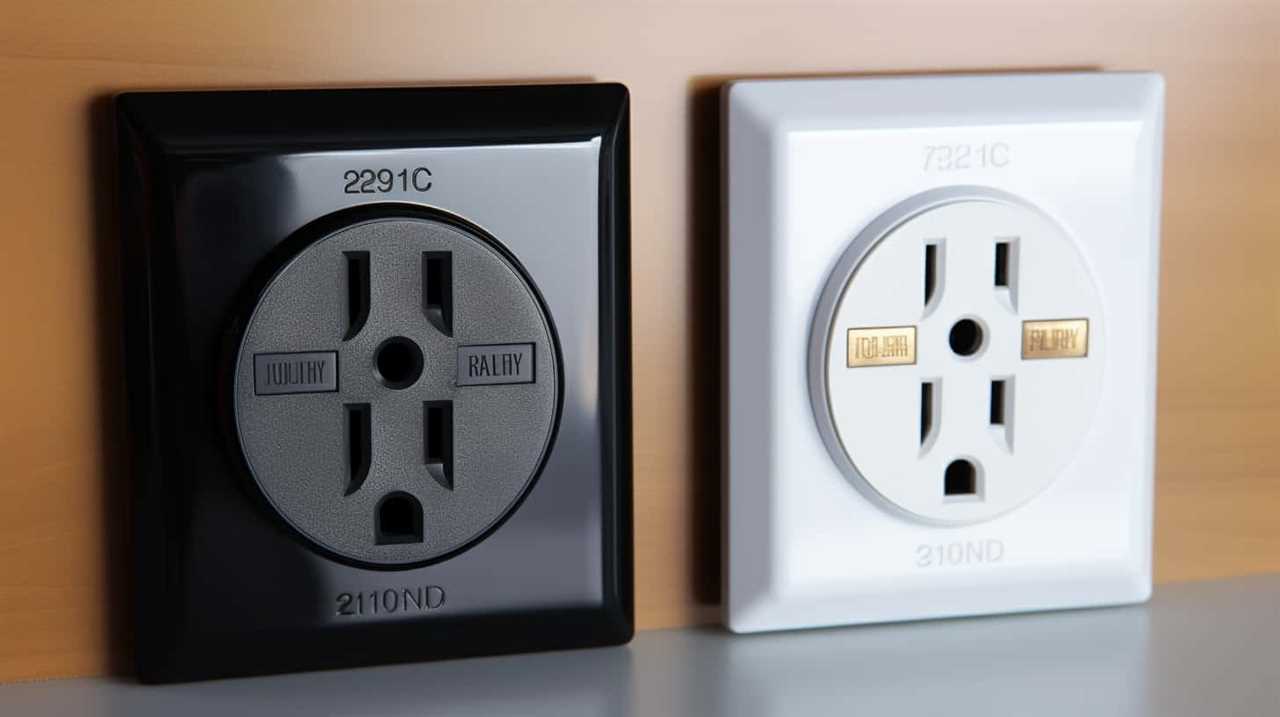
What Are the Common Signs That Indicate a Need for Appliance Repair?
When it comes to troubleshooting appliance issues, recognizing the signs of appliance repair is crucial.
Common indications include:
- Unusual noises
- Leaks
- Excessive energy consumption
- Inconsistent temperature
These signs may indicate problems with the motor, seals, or thermostat.
It’s important to address these issues promptly to prevent further damage and costly repairs.
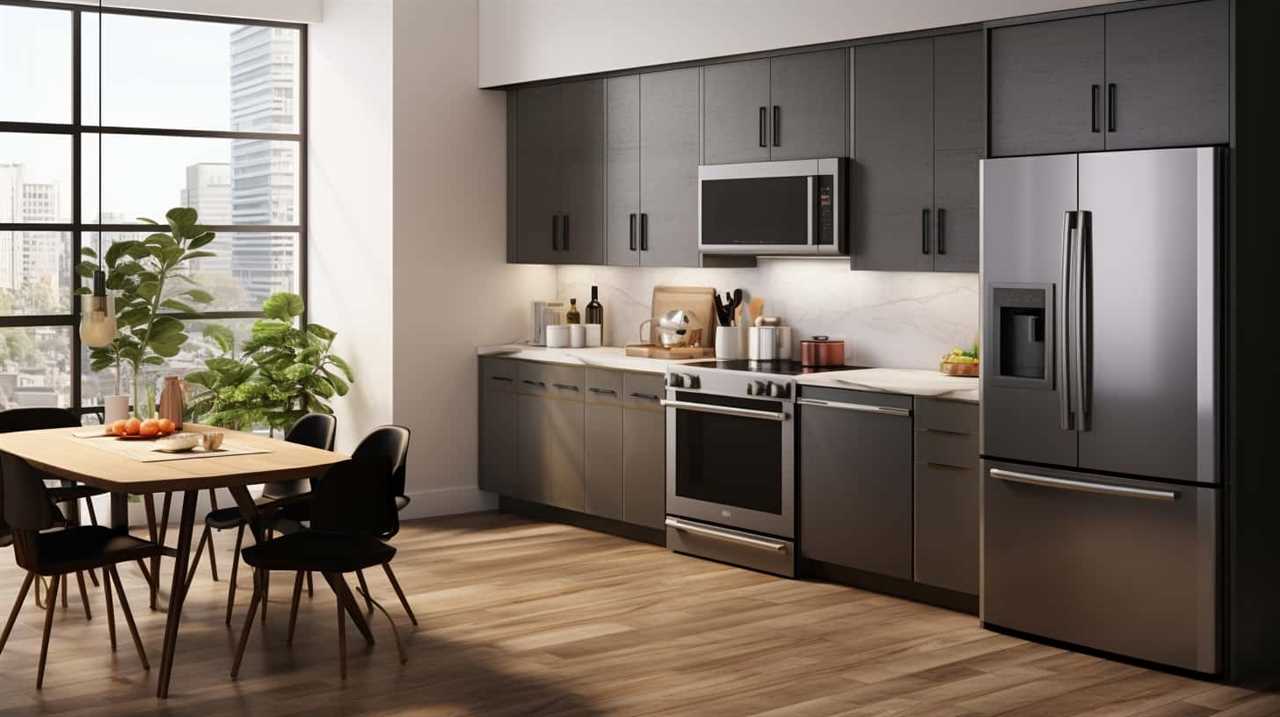
Can Regular Maintenance Help Extend the Lifespan of Commercial Appliances?
Regular maintenance is crucial for extending the lifespan of commercial appliances.
By performing preventative maintenance, we can identify and address any minor issues before they escalate into major problems. This proactive approach helps to minimize downtime and costly repairs, ensuring that the appliances continue to operate efficiently and effectively.
Additionally, regular maintenance helps to improve the overall performance and energy efficiency of the appliances, resulting in reduced operating costs and increased productivity.
Therefore, investing in regular maintenance is highly beneficial for commercial appliance longevity.
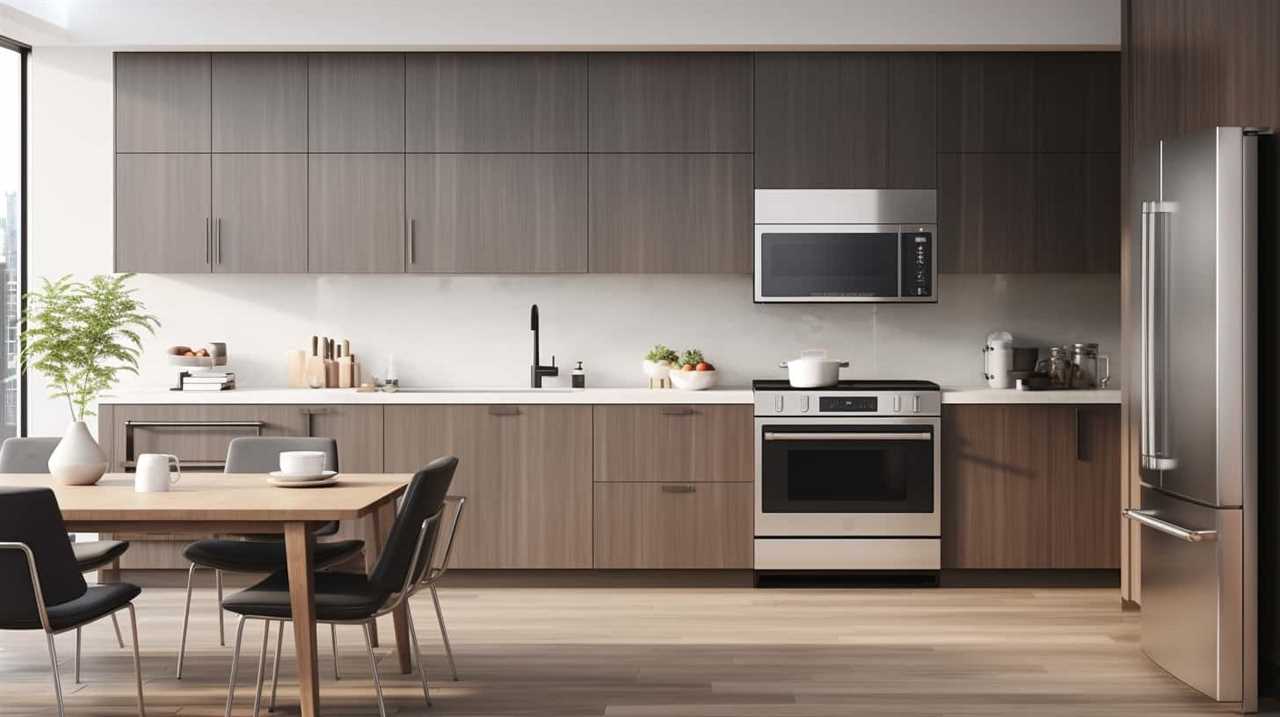
Are There Any Specific Cleaning Products or Techniques Recommended for Sanitizing Appliances?
When it comes to sanitizing appliances, using the right cleaning products and techniques is crucial.
There are specific cleaning products available that are designed to effectively sanitize commercial appliances. These products are formulated to kill bacteria and other microorganisms that can contaminate the surfaces of the appliances.
Additionally, there are various sanitizing techniques that can be employed, such as steam cleaning or using disinfectant sprays.
How Can Improper Calibration of Temperature Controls Affect the Performance of Appliances?
Improper calibration of temperature controls can have a significant impact on the performance of appliances. When the temperature controls aren’t calibrated correctly, there’s a risk of inconsistent temperatures, which can affect the quality and safety of the products being stored or cooked.

This can lead to food spoilage or even potential health risks. It’s crucial to regularly calibrate the temperature controls to ensure accurate and reliable performance, maintaining the integrity of the products and ensuring customer satisfaction.
How Can I Maintain My Commercial Appliances to Prevent Heating Problems?
Regular oven heating maintenance and repair is crucial for preventing heating problems in commercial appliances. Ensure that the heating elements are clean and functioning properly. Schedule routine inspections and cleanings to keep the oven performing at its best. Address any repairs promptly to avoid potential downtime and costly replacements.
Conclusion
In conclusion, regular maintenance of commercial appliances is crucial for their efficient and safe operation. By following the tips outlined in this article, such as cleaning and sanitizing appliances, checking and replacing filters, inspecting electrical components, and properly maintaining gas burners and exhaust hoods, you can ensure the longevity and optimal performance of your appliances.
Don’t underestimate the importance of training your staff on appliance maintenance procedures. Neglecting these tasks could lead to costly breakdowns and potential safety hazards.
Stay tuned for more helpful maintenance tips in the future.



